Students can Download Sanskrit Lesson 19 भीष्मोक्तयः Questions and Answers, Summary, Notes Pdf, Activity, KSEEB Solutions for Class 10 Sanskrit helps you to revise the complete Karnataka State Board Syllabus and score more marks in your examinations.
Karnataka State Syllabus Class 10 Sanskrit नंदिनी Chapter 19 भीष्मोक्तयः (उपदेशकाव्यम्)
भीष्मोक्तयः Questions and Answers, Summary, Notes
अभ्यासः
I. एकवाक्येन उत्तरं लिखत ।
प्रश्न 1.
पाण्डवेषु कः राजपदवीम् अलभत ?
उत्तरम्
पाण्डवेषु युधिष्ठिरः राजपदवीम् अलभत ।
प्रश्न 2.
उप्तं बीजं केन विना निष्फलं भवति ।
उत्तरम्
उप्तं बीजं क्षेत्रं विना निष्फलं भवति ।
प्रश्न 3.
कीदृशेण कर्मणा सौख्यं भवति ?
उत्तरम्
शुभेण कर्मणा सौख्यं भवति ।
![]()
प्रश्न 4.
कीदृशस्य पुरुषस्य धर्मेबुद्धिः न जायते ?
उत्तरम्
लोभमोहाभिभूतस्य च रागद्वेषान्वितस्य पुरुषस्य धर्मे बुद्धिः न जायते ।
प्रश्न 5.
मानवः कथं निर्वेदम् आदत्ते ?
उत्तरम्
मानवः ज्ञानचक्षुषा निर्वेदम् आदत्ते।
II. रिक्तस्थानं पूरयत :
- दुःखं पापेन कर्मणा भवति ।
- मानवः कुशलेनैव धर्मेण गतिमिष्टां प्रपद्यते ।
- युधिष्ठिरः राजधर्मं बोधयितुं भीष्मं प्रार्थयत।
- निर्वेदमापन्नः धर्मात्मा पापं कर्म च जहाति ।
III. विरुद्धार्थकं पदं लिखत ।
- सफलम् × विफलम्
- संशयम् × असंशयम्
- मार्दवम् × काठिण्यम्
IV. लिङ्ग-विभक्ति-वचनानि लिखत ।
- कर्मणा – नपुंसकलिङ्गः – तृतीयाविभक्तिः – एकवचनम् ।
- कर्मणा – नपुंसकलिङ्गः – प्रथमाविभक्तिः – एकवचनम् ।
- श्रेयः – नपुंसकलिङ्गः – तृतीयाविभक्तिः – एकवचनम् ।
![]()
V. वाक्यदोषं परिहरत :
प्रश्न 1.
पुरुषकारस्य विना दैवं न सिध्यति ।
उत्तरम्
पुरुषकारेण विना दैवं न सिध्यति ।
प्रश्न 2.
धर्मेण इष्टं गतिं प्रपद्यति ।
उत्तरम्
धर्मेण इष्टां गतिं प्रपद्यते ।
VI. लघूत्तरं लिखत ।
प्रश्न 1.
भीष्मेन दैवपुरुषकारयोः विषये किमुक्तम् ?
उत्तरम्
भीष्मेन दैवपुरुषकारयोः विषये एवम् उक्तम् – यथा क्षेत्रं विना उप्तं बीजं निष्फलं भवति तथा दैवं विना पुरुषकारेण न सिध्यति । पुरुषप्रयत्नः
विधिः च द्वावपि आवश्यकौ ।
प्रश्न 2.
मानवः निर्वेदं कथम् आप्नोति ? ततः सः किं कुरुते ?
उत्तरम्
मानवः ज्ञानचक्षुषा निर्वेदम् आप्नोति। ततः सः कामे-रसे-गन्धे न. रज्यते । शनैः पापं कर्म जहाति। मोक्षं लभते च ।
VII. यथानिर्देशं लिखत ।
1. किंस्वित् श्रेष्ठतरं भवेत् ?
कः पाठः ? भीष्मोक्तयः इति पाठः ।
कः अपृच्छत् ? युधिष्ठिरः अपृच्छत् ।
कम् अपृच्छत् ? भीष्मं अपृच्छत् ।
2. रसे गन्धे न रज्यते ।।
कः पाठः ? भीष्मोक्तयः इति पाठः ।
कः अवदत् ? भीष्मः अवदत् ।
कः न रज्यते ? प्राज्ञः न रज्यते ।
![]()
VIII. दशभिः वाक्यै : उत्तरं संस्कृतभाषया, कन्नडभाषया, आङ्गलभाषया वा लिखत ।
प्रश्न 1.
भीष्म युधिष्ठिरयोः संवादं पद्यानुगुणं संगृह्य लिखत ।
उत्तरम्
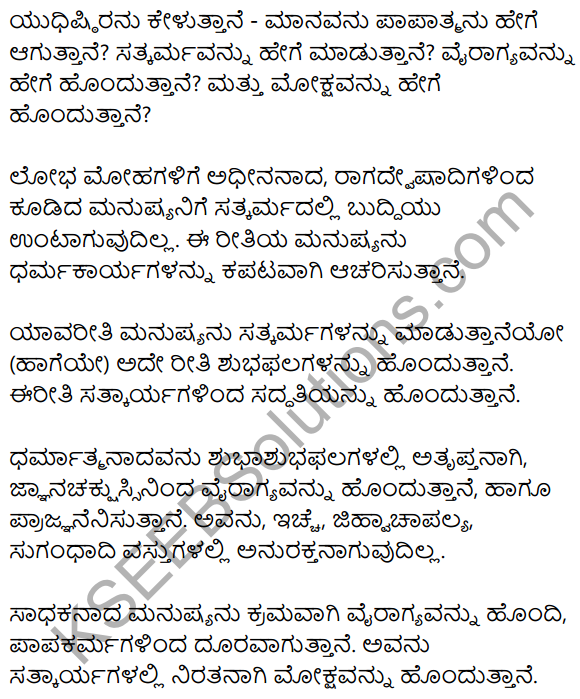
Yudhisthira asked Bheeshma – How can a person become a sinner (evil minded)? How can a person able to do noble deeds? How can he attain Vairagya- (absence of worldly desires or passions)? How can he get salvation? (liberation)
One who controlled by cupidity and confusion, he will not able to do the good deeds. This type of person do the good work trickery (cheating way)
One who perform the work with devotion will aitain salvation. This is called Hçfa (sadgathi) noble place.
A pious (virtuous) person will get vairagya (detachment) and he will be called a pragna or wise man. He will not be pleased by the taste and fragrance, because he wishes to aŭtain the highest place.
Like this, a virtuous (pious) person gradually will attain detachment and he will be away from the bad deeds. Like this, by doing noble work, he will attain salvation (highest place) (he is called hea i.e, efficient).
![]()
इतरप्रश्नाः
I. सूक्तम् उत्तरं चित्वा लिखत ।
प्रश्न 1.
‘महाभारतम्’ अनेन ग्रथितः ।
(a) व्यासमहर्षिणा
(b) वाल्मीकिना
(c) कालिदासेन
(d) भासेन
प्रश्न 2.
महाभारतयुद्धे एते जिताः ।
(a) कौरवाः
(b) पाण्डवाः
(c) यादवाः
(d) पल्लवाः
प्रश्न 3.
अस्याः तीरे भीष्मः शरतल्पे शायितवान् ।
(a) गङ्गा
(b) यमुना
(c) ओघवती
(d) सरस्वती
प्रश्न 4.
भीष्मः एनम् उपदिदेश ।
(a) अर्जुनम्
(b) कर्णम्
(c) धृतराष्ट्रम्
(d) युधिष्ठिरम्
प्रश्न 5.
अनेन कर्मणा दुःखं भवति ।
(a) पापेन
(b) शुभेन
(c) अशुभेन
(d) देवेन
![]()
प्रश्न 6.
धर्मात्मा अनेन निर्वेदम् आदत्ते ।
(a) ज्ञानेन
(b) ज्ञानचक्षुषा
(c) चक्षुषा
(d) विज्ञानेन
प्रश्न 7.
‘कूटस्थम्’ शब्दस्य एषः अर्थः ।
(a) अशाश्वतम्
(b) शुभम्
(c) शाश्वतम्
(d) अशुभम्
प्रश्न 8.
अत्र समूहेतरपदम् इदं भवति ।
(a) व्यासः
(b) सत्यवती
(c) पराशरः
(d) श्रीकृष्णः
प्रश्न 9.
‘फलति’ इत्यत्र एषः लकारः वर्तते ।
(a) लट्
(b) लङ्
(c) लोट
(d) लृट्
प्रश्न 10.
पाण्डवेषु एषः ज्येष्ठः ।
(a) युधिष्ठिरः
(b) अर्जुनः
(c) भीमः
(d) कर्णः
![]()
II. अन्यलिङ्गरूपं लिखत
- राजा – राज्ञी;
- एकः – एका
- गुरुः – गुर्वाणी
- पितामहः – पितामही
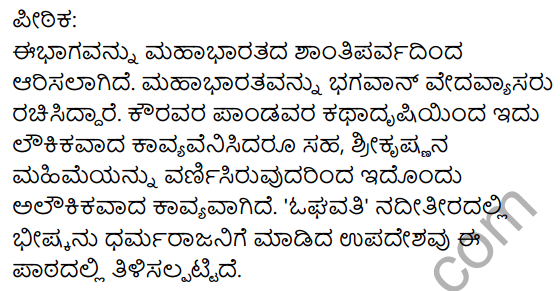
Introduction:
This lesson is a part chosen from the Shanti chapter of Mahabharatha. The epic Mahabharatha is composed by respected Vedavyasa Maharishi. This is the most superior, vast and beautifully composed epic of Sanskrit language. Mahabharatha tells us about the story of Kauravas and Pandavas. Lord Krishna’s avatars in human form and his greatness personifies this epic as philosophical work. This poem is a compilation of Bheeshma’s advice to Dharmaraja.
पीठिका
भगवता व्यासमहर्षिणा ग्रथितः महान्ग्रन्थः ‘महाभारतम्’। अत्र कौरवपाण्डवयोः कथा सुप्रसिद्धा। अयं पद्यभागः महाभारतस्य शान्तिपर्वणः स्वीकृतः। ओघवती नदीतीरे शरतल्पे शयितः भीष्मः युधिष्ठिरं प्रति एवम् उपदिदेश ।
कविकाव्यविचारः
- कविः – वेदव्यासः ।
- मातापितरौ – सत्यवती पराशरः च ।
- देशः – यमुनानदीद्वीपः
- काल: – द्वापरयुगम् । क्रि.पू. 6 शतकात् पूर्वम्
- कृतयः – महाभारतम्, ब्रह्मसूत्राणि, अष्टादशपुराणानि ।
भीष्मोक्तयः Summary in Kannada
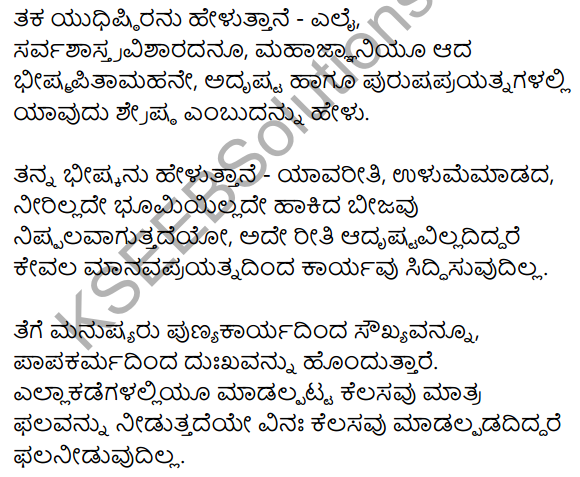
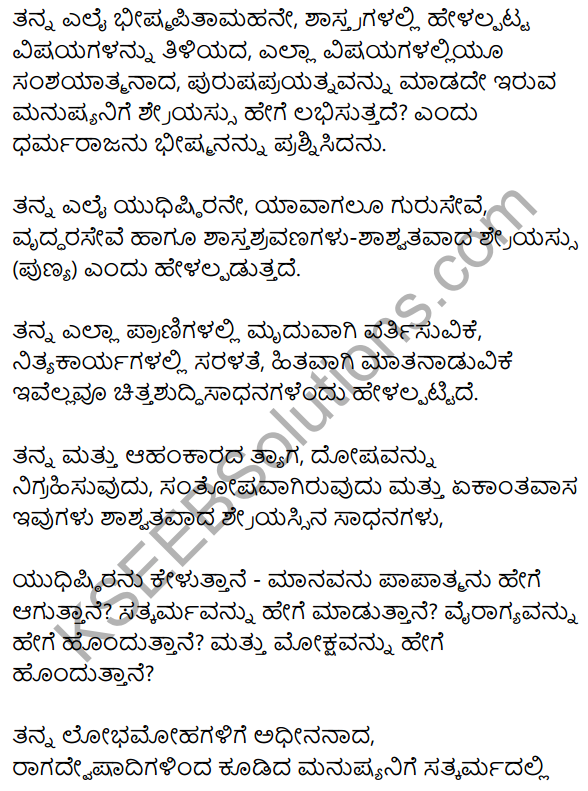
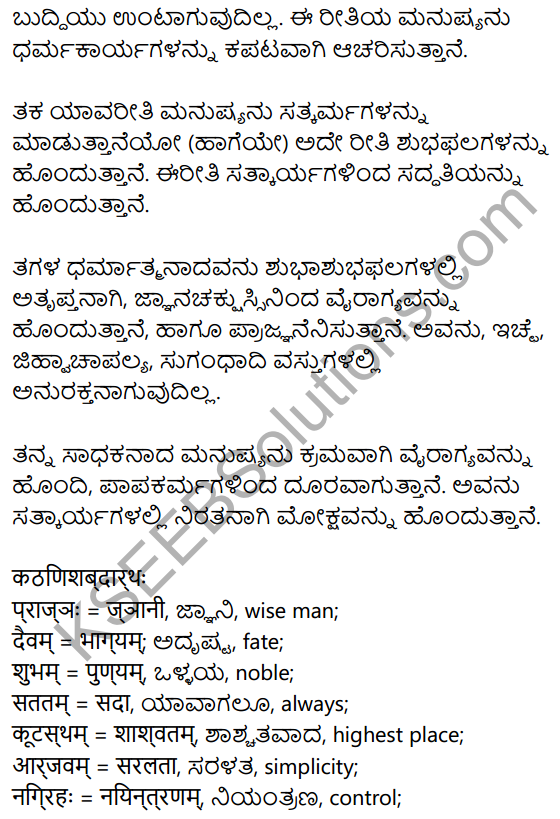

![]()
भीष्मोक्तयः Summary in English
Yudhisthira says – O! grandfather Bheeshma, you are well versed in all Shastras and the knower of everything, please tell me which is the best among the fate and the manly duty.
Bheeshma says-Without (ploughing) the field and the water a seed cannot sprout up. Like this, without fate, there is no use of the effort done by a person. (fate is important than the man’s effort)
People will attain happiness by doing good deeds and unhappiness by doing bad deeds. The work done by a person will give the fruit definitely. But one cannot expect the fruit without doing the work.
Dharmaraja asked Bheeshma like this – How can a person get the fruit without doing the work? Without having faith in the Shastras and doubting everything. Please tell me about this.
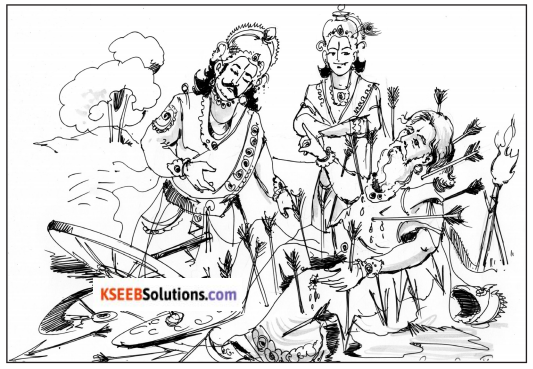
O! Yudhistira, one who serve the aged people and one who · have faith in the Shastras will attain (get) the blessings of God.
Softness among all the living beings, simplicity in the work, good talking – these are all called as noble-mindedness of a person.
And leaving egotism (pride), control over the defect (sin, guilt), being happy and lonely living- these are the tools of religious merit श्रेय:
Yudhisthira asked Bheeshma – How can a person become a sinner (evil-minded)? How can a person able to do noble deeds? How can he attain Vairagya- (absence of worldly desires or passions)? How can he get salvation? (liberation)
One who controlled by cupidity and confusion, he will not able to do the good deeds. This type of person does the good work trickery (cheating way)
One who performs the work with devotion will attain salvation. This is called Hela (sadgathi) noble place.
![]()
A pious (virtuous) person will get vairagya (detachment) and he will be called a pragnå or wise man. He will not be pleased by the taste and fragrance, because he wishes to attain the highest place.
Like this, a virtuous (pious) person gradually will attain detachment and he will be away from the bad deeds. Like this, by doing noble work, he will attain salvation (highest place) (he is called साधक i.e. efficient).
भीष्मोक्तयः Summary in Sanskrit
सारांशः
1. पितामह महाप्राज्ञ सर्वशास्त्र विशारद ।
दैवे पुरुषकारे च किंस्वित् श्रेष्ठतरं भवेत् ।।
2. यथा बीजं विना क्षेत्रमुप्तं भवति निष्फलम्।
तथा पुरुषकारेण विना दैवं न सिध्यति ।।
3. शुभेन कर्मणा सौख्यं दःखं पापेन कर्मणा ।
कृतं फलति सर्वत्र नाकृतं भुज्यते क्वचित्।।
4. अतत्वज्ञस्य शास्त्राणां सततं सशयात्मनः ।
अकृतव्यवसायस्य श्रेयो ब्रूहि पितामह ।।
![]()
5. गुरुपूजा च सततं वृद्धानां पर्युपासनम् ।
श्रवणं चैव शास्त्राणां कूटस्थं श्रेय उच्यते।।
6. मार्दवं सर्वभूतेषु व्यवहारेषु चार्जवम् ।
वाक् चैव मधुरा प्रोका श्रेय एतदसंशयम् ।।
7. अहङ्कारस्य च त्यागः प्रमादस्य च निग्रहः।
सन्तोष श्चैकचर्या च कूटस्थं श्रेय उच्यते।।
8. कथं भवति पापात्मा कथं धर्म करोति वा।
केन निर्वेदमादत्ते मोक्षं वा केन गच्छति ।।
9. लोभमोहाभिभूतस्य रागद्वेषान्वितस्य च।
न धर्मे जायते बुद्धिः व्याजाद्धर्मं करोति च ॥
10. यथा कुशलधर्मा स कुशलं प्रतिपद्यते ।
कुशलेनैव धर्मेण गतिमिष्टां प्रपद्यते ।।
![]()
11. अतृप्यमाणे निवेदमादत्ते ज्ञान चक्षुषा ।
प्रज्ञाचक्षुर्यदा कामे रसे गन्धे च रज्यते ।।
12. शनैर्निर्वेदमादत्ते पापं कर्म जहाति च ।
धर्मात्मा चैव भवति मोक्षं च लभते परम् ।।